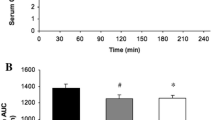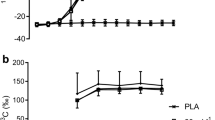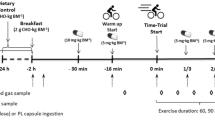Summary
Five men were studied during exercise to exhaustion on an electrically braked cycle ergometer at 70% of % MathType!MTEF!2!1!+-% feaafiart1ev1aaatCvAUfeBSjuyZL2yd9gzLbvyNv2CaerbuLwBLn% hiov2DGi1BTfMBaeXatLxBI9gBaerbd9wDYLwzYbItLDharqqtubsr% 4rNCHbGeaGqiVq0xe9tqqrpepC0xbbL8F4rqqrFfpeea0xe9sq-Jc9% vqaqpepm0xbba9pwe9Q8fs0-yqaqpepae9pg0Firpepe0de9vr0-vr% 0-vqpWqaaeaabiGaciaacaqabeaadaqaaqaaaOqaaKaaGkqadAfaga% GaaOWaaSbaaSqaaiaab+eadaWgaaqccawaaiaabkdacaqGGaGaaeyB% aiaabggacaqG4baameqaaaWcbeaaaaa!3C9E!\[\dot V_{{\text{O}}_{{\text{2 max}}} } \]. The four experimental treatments were as follows: fasted for 36 h (A); fasted (36 h) and refed with glucose (B) or glycerol (C); postabsorptive (overnight fast, D). In B and C the subjects were given a drink containing glucose or glycerol (lg per kg body weight) 45 min before starting exercise. A placebo drink was given 45 min before exercise on treatments A and D. Despite an increased availability of circulating free fatty acids, β-hydroxybutyrate and glycerol exercise time to exhaustion was significantly lower after fasting (treatment A 77.7±6.8 min) compared with treatment D (119.5±5.8 min). Refeeding with glucose or glycerol did not significantly improve performance (92.4±11.8 min and 80.8±3.6 min respectively) compared with treatment A and lowered circulating levels of FFA and β — HB during exercise compared with A. Despite the probability of low liver glycogen levels after fasting, none of the subjects became hypoglycaemic (blood glucose <4 mmol · l−1) during exercise and their blood lactate concentrations were not high at exhaustion. Plasma levels of branched chain amino acids (BCAA) decreased progressively during exercise on treatments A, B and C and were considerably lower at exhaustion compared with treatment D. Falling plasma concentrations of BCAA during prolonged exercise may be implicated in the generation of central fatigue.
Similar content being viewed by others
References
Acworth I, Nicholass J, Morgan B, Newsholme EA (1986) Effect of sustained exercise on concentrations of plasma aromatic and branched chain amino acids and brain amines. Biochem Biophys Res Comm 137:149–153
Bergstrom J, Hermansen L, Hultman E, Saltin B (1967) Diet, muscle glycogen and physical performance. Acta Physiol Scand 71:140–150
Boobis LH, Maughan RJ (1983) A simple one-step enzymatic fluorimetric method for the determination of glycerol in 20 μl of plasma. Clin Chim Acta 132:173–179
Costill DL, Coyle E, Dalsky G (1977) Effects of elevated plasma FFA and insulin on muscle glycogen usage during exercise. J Appl Physiol 43:695–699
Dill DB, Costill DL (1974) Calculation of percentage changes in volumes of blood, plasma, and red cells in dehydration. J Appl Physiol 37:247–248
Dohm GL, Tapscott EB, Barakat HA, Kasperek GJ (1983) Influence of fasting on glycogen depletion in rats during exercise. J Appl Physiol 55:830–833
Gleeson M, Maughan RJ (1987) A simple enzymatic fluorimetric method for the determination of branched chain L-amino acids in microlitre volumes of plasma. Clin Chim Acta 166:163–169
Hermansen L, Hultman E, Saltin B (1967) Muscle glycogen during prolonged severe exercise. Acta Physiol Scand 71:129–139
Hickson RC, Rennie MJ, Conlee RK, Winder WW, Holloszy JO (1977) Effects of increased plasma free fatty acids on glycogen utilization and endurance. J Appl Physiol 43:829–833
Hultman E (1967) Physiological role of muscle glycogen in man with special reference to exercise. Circ Res [Suppl 20–21] 1:99–111
Jones NL, Sutton JR, Toews CJ (1981) Fat metabolism in heavy exercise. In: Poortmans J, Niset G (eds) Biochemistry of exercise IV-A. University Park, Baltimore, pp 123–124
Karlsson J, Saltin B (1971) Diet, muscle glycogen and endurance performance. J Appl Physiol 31:203–206
Loy SF, Conlee RK, Winder WW, Nelson AG, Arnall DA, Fisher AG (1986) Effects of a 24 h fast on cycling endurance time at two different intensities. J Appl Physiol 61:654–659
Lund P (1985) Glutamine UV-method with Glutaminase and Glutamate Dehyrogenase. In: Bergmeyer HU (ed) Methods of enzymatic analysis, vol VIII Metabolites 3: Lipids, amino acids and related compounds. VCF, Weinheim, pp 357–363
Maughan RJ (1982) A simple, rapid method for determination of glucose, lactate, pyruvate, alanine, 3-hydroxybutyrate and acetoacetate in a single 20 μl blood sample. Clin Chim Acta 122:231–240
Maughan RJ, Williams C (1981) Differential effects of fasting on skeletal muscle glycogen content in man and on skeletal and cardiac muscle glycogen content in the rat. Proc Nutr Soc. 40:85A
Newsholme EA (1987) Application of metabolic logic to the questions of causes of fatigue in marathon races. In: Macleod D, Maughan RJ, Nimmo M, Reilly T, Williams C (eds) Exercise; Benefits, limits and adaptations. E & F Spon, pp 181–204
Nilsson LH, Hultman E (1973) Liver glycogen in man — effect of total starvation or a carbohydrate-poor diet followed by carbohydrate refeeding. Scand J Clin Lab Invest 32:325–330
Noma A, Okabe H, Kita M (1973) A new colorimetric micro-determination of free fatty acids in serum. Clin Chim Acta 43:317–320
Rapp RD (1963) Determination of serum amino acids. Clin Chem 9:27–30
Author information
Authors and Affiliations
Rights and permissions
About this article
Cite this article
Maughan, R.J., Gleeson, M. Influence of a 36 h fast followed by refeeding with glucose, glycerol or placebo on metabolism and performance during prolonged exercise in man. Europ. J. Appl. Physiol. 57, 570–576 (1988). https://doi.org/10.1007/BF00418464
Accepted:
Issue Date:
DOI: https://doi.org/10.1007/BF00418464




